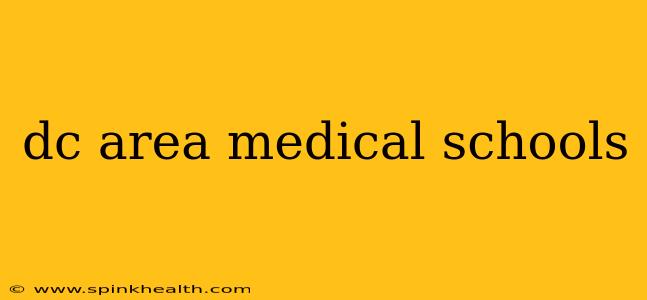Navigating the Landscape of DC Area Medical Schools: A Comprehensive Guide
The Washington, D.C. area boasts a vibrant and prestigious medical education scene, attracting aspiring physicians from across the nation and around the globe. But with several excellent options, choosing the right medical school can feel overwhelming. This guide unravels the intricacies of the DC area's medical schools, helping you navigate your path to becoming a doctor.
My name is Dr. Emily Carter, and I've spent over a decade working in medical education and research within the DC metro area. I've witnessed firsthand the dedication and passion of students at these institutions, and I'm excited to share my insights with you.
Let's embark on this journey together, exploring the unique offerings of each school and addressing some common questions.
What are the best medical schools in the DC area?
This isn't a simple question with a single answer, as "best" depends heavily on individual priorities and career goals. However, the DC area consistently ranks high for medical education, largely due to the presence of renowned institutions like:
-
Georgetown University School of Medicine: Renowned for its Jesuit values and commitment to community service, Georgetown offers a rigorous curriculum and strong research opportunities. Its location in the heart of Washington, D.C., provides unparalleled access to diverse patient populations and prominent healthcare organizations.
-
Uniformed Services University of the Health Sciences (USU): This unique school focuses on training physicians for the military. Students receive a strong foundation in medicine while also serving their country. USU offers a distinct pathway, particularly appealing to those with a commitment to military service.
-
Howard University College of Medicine: Historically significant and deeply committed to diversity and inclusion, Howard University stands out for its commitment to serving underserved communities. The school fosters an environment of collaboration and community engagement, shaping physicians dedicated to health equity.
These are just three prominent examples. The broader DC area also benefits from the proximity of medical schools in neighboring states, further expanding the options available.
What are the admission requirements for medical schools in the DC area?
The admission requirements for medical schools in the DC area, and indeed across the United States, are highly competitive. Expect to demonstrate:
- Strong academic record: A high GPA (typically above 3.7) is essential.
- Excellent MCAT score: A high MCAT score is crucial for competitiveness.
- Meaningful extracurricular activities: Showcasing involvement in meaningful activities, such as volunteering in healthcare settings or research experience, is crucial.
- Strong letters of recommendation: Obtain strong letters of recommendation from professors and mentors who can speak to your academic abilities and personal qualities.
- Compelling personal statement: Your personal statement should effectively communicate your motivations for pursuing medicine, highlighting your experiences and aspirations.
Each school has specific requirements, so it's imperative to consult each institution's website for detailed information.
How much does it cost to attend medical school in the DC area?
Medical school is a significant financial investment. Tuition varies among institutions, but you should expect substantial costs, including tuition, fees, and living expenses. Thoroughly researching financial aid options, scholarships, and loan programs is vital.
What are the job prospects after graduating from a DC area medical school?
Graduates from DC area medical schools typically have excellent job prospects, thanks to the region's thriving healthcare industry and the high demand for physicians. The robust network of hospitals and research institutions in the area often provides excellent opportunities for residency and future career development.
What are the specialties offered at these medical schools?
The specific specialties offered will vary between institutions. However, most medical schools in the DC area provide a broad range of specializations, from primary care to highly specialized fields, often reflecting the diversity of medical needs within the nation’s capital. Explore the individual school websites for detailed program information.
This comprehensive guide provides a foundational understanding of the DC area's medical schools. Remember to conduct thorough research on each institution to determine the best fit for your individual aspirations and career goals. The path to becoming a physician is challenging but incredibly rewarding. Good luck!

